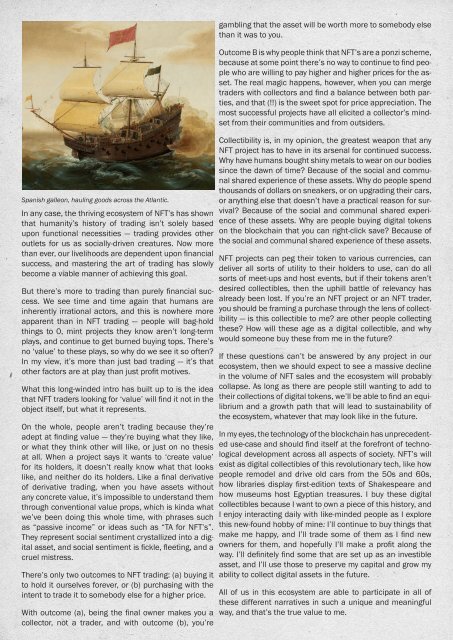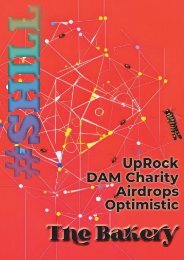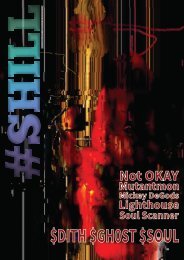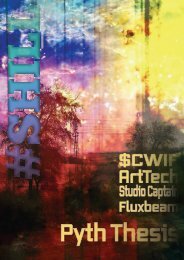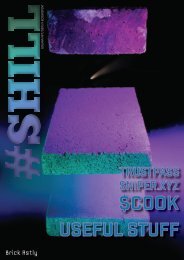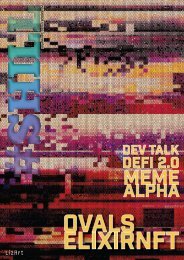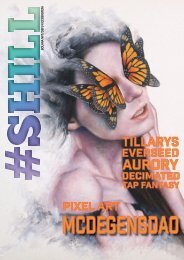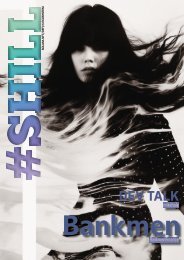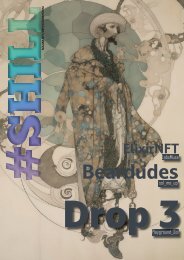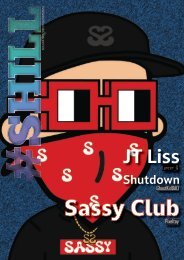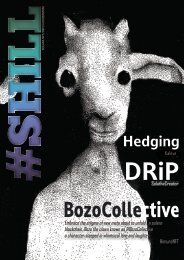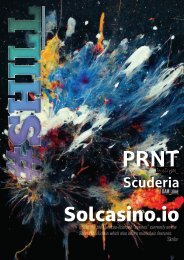You also want an ePaper? Increase the reach of your titles
YUMPU automatically turns print PDFs into web optimized ePapers that Google loves.
Spanish galleon, hauling goods across the Atlantic.<br />
In any case, the thriving ecosystem of NFT’s has shown<br />
that humanity’s history of trading isn’t solely based<br />
upon functional necessities — trading provides other<br />
outlets for us as socially-driven creatures. Now more<br />
than ever, our livelihoods are dependent upon financial<br />
success, and mastering the art of trading has slowly<br />
become a viable manner of achieving this goal.<br />
But there’s more to trading than purely financial success.<br />
We see time and time again that humans are<br />
inherently irrational actors, and this is nowhere more<br />
apparent than in NFT trading — people will bag-hold<br />
things to 0, mint projects they know aren’t long-term<br />
plays, and continue to get burned buying tops. There’s<br />
no ‘value’ to these plays, so why do we see it so often?<br />
In my view, it’s more than just bad trading — it’s that<br />
other factors are at play than just profit motives.<br />
What this long-winded intro has built up to is the idea<br />
that NFT traders looking for ‘value’ will find it not in the<br />
object itself, but what it represents.<br />
On the whole, people aren’t trading because they’re<br />
adept at finding value — they’re buying what they like,<br />
or what they think other will like, or just on no thesis<br />
at all. When a project says it wants to ‘create value’<br />
for its holders, it doesn’t really know what that looks<br />
like, and neither do its holders. Like a final derivative<br />
of derivative trading, when you have assets without<br />
any concrete value, it’s impossible to understand them<br />
through conventional value props, which is kinda what<br />
we’ve been doing this whole time, with phrases such<br />
as “passive income” or ideas such as “TA for NFT’s”.<br />
They represent social sentiment crystallized into a digital<br />
asset, and social sentiment is fickle, fleeting, and a<br />
cruel mistress.<br />
There’s only two outcomes to NFT trading: (a) buying it<br />
to hold it ourselves forever, or (b) purchasing with the<br />
intent to trade it to somebody else for a higher price.<br />
With outcome (a), being the final owner makes you a<br />
collector, not a trader, and with outcome (b), you’re<br />
gambling that the asset will be worth more to somebody else<br />
than it was to you.<br />
Outcome B is why people think that NFT’s are a ponzi scheme,<br />
because at some point there’s no way to continue to find people<br />
who are willing to pay higher and higher prices for the asset.<br />
The real magic happens, however, when you can merge<br />
traders with collectors and find a balance between both parties,<br />
and that (!!) is the sweet spot for price appreciation. The<br />
most successful projects have all elicited a collector’s mindset<br />
from their communities and from outsiders.<br />
Collectibility is, in my opinion, the greatest weapon that any<br />
NFT project has to have in its arsenal for continued success.<br />
Why have humans bought shiny metals to wear on our bodies<br />
since the dawn of time? Because of the social and communal<br />
shared experience of these assets. Why do people spend<br />
thousands of dollars on sneakers, or on upgrading their cars,<br />
or anything else that doesn’t have a practical reason for survival?<br />
Because of the social and communal shared experience<br />
of these assets. Why are people buying digital tokens<br />
on the blockchain that you can right-click save? Because of<br />
the social and communal shared experience of these assets.<br />
NFT projects can peg their token to various currencies, can<br />
deliver all sorts of utility to their holders to use, can do all<br />
sorts of meet-ups and host events, but if their tokens aren’t<br />
desired collectibles, then the uphill battle of relevancy has<br />
already been lost. If you’re an NFT project or an NFT trader,<br />
you should be framing a purchase through the lens of collectibility<br />
— is this collectible to me? are other people collecting<br />
these? How will these age as a digital collectible, and why<br />
would someone buy these from me in the future?<br />
If these questions can’t be answered by any project in our<br />
ecosystem, then we should expect to see a massive decline<br />
in the volume of NFT sales and the ecosystem will probably<br />
collapse. As long as there are people still wanting to add to<br />
their collections of digital tokens, we’ll be able to find an equilibrium<br />
and a growth path that will lead to sustainability of<br />
the ecosystem, whatever that may look like in the future.<br />
In my eyes, the technology of the blockchain has unprecedented<br />
use-case and should find itself at the forefront of technological<br />
development across all aspects of society. NFT’s will<br />
exist as digital collectibles of this revolutionary tech, like how<br />
people remodel and drive old cars from the 50s and 60s,<br />
how libraries display first-edition texts of Shakespeare and<br />
how museums host Egyptian treasures. I buy these digital<br />
collectibles because I want to own a piece of this history, and<br />
I enjoy interacting daily with like-minded people as I explore<br />
this new-found hobby of mine. I’ll continue to buy things that<br />
make me happy, and I’ll trade some of them as I find new<br />
owners for them, and hopefully I’ll make a profit along the<br />
way. I’ll definitely find some that are set up as an investible<br />
asset, and I’ll use those to preserve my capital and grow my<br />
ability to collect digital assets in the future.<br />
All of us in this ecosystem are able to participate in all of<br />
these different narratives in such a unique and meaningful<br />
way, and that’s the true value to me.


